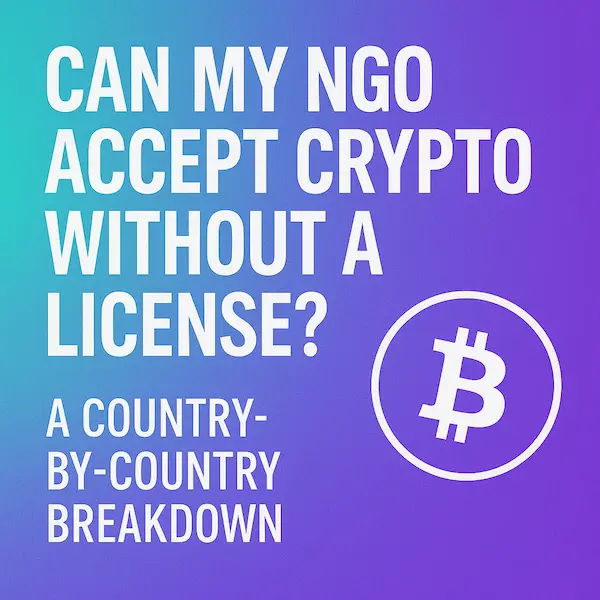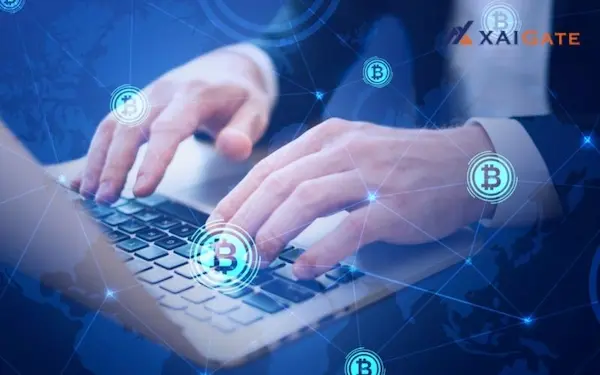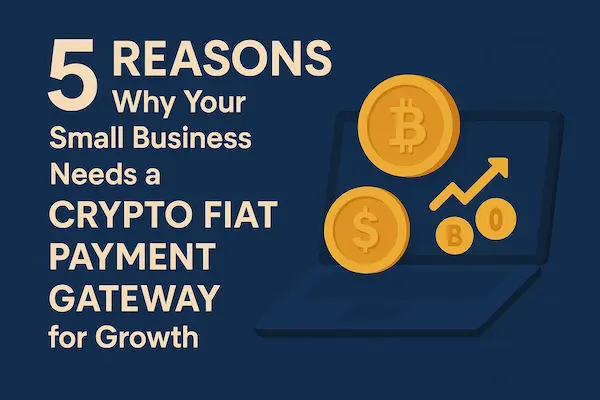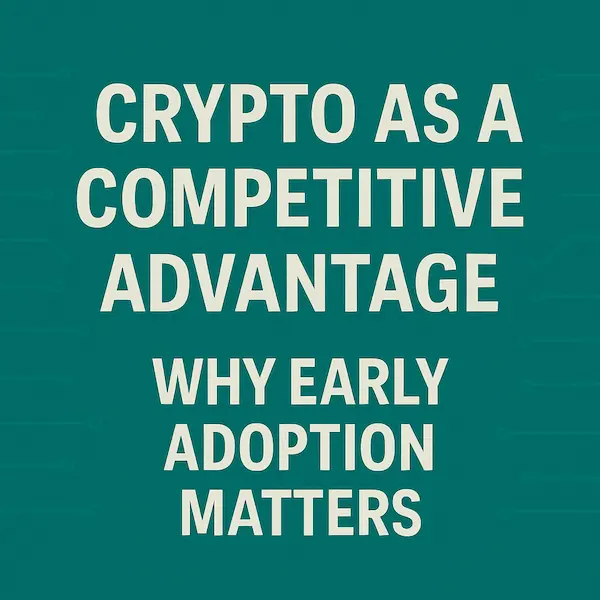The philanthropy landscape is shifting, and so too are the fundraising mechanisms of non-governmental organizations (NGOs). One such novel technology that has positioned itself as an enabler of global philanthropy is cryptocurrency. All very good questions from an NGO leader’s perspective when asking whether his or her NGO can accept crypto without a license. The truth is it’s quite complicated and really depends heavily on where one’s at and how they’re operating.
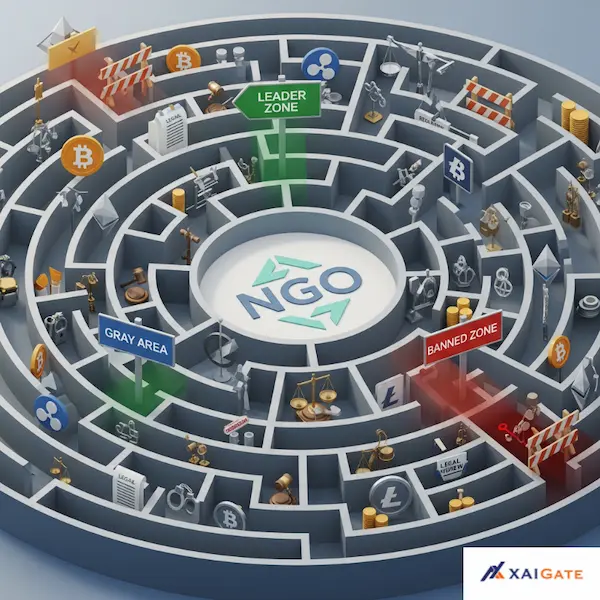
The short answer is that in most crypto-friendly or regulated countries, an NGO can accept crypto without a license provided they are not acting as a financial service provider. The difference between simply receiving donations and providing, say, exchange, or custody or trading services for cryptocurrencies. Most regulations, like the EU’s MiCA, are meant for monitoring these service providers rather than the end recipients of the donations.
Contents
- 1 Digital Frontiers: A New Era for NGO Fundraising
- 2 United States: A Cautious but Open Approach
- 3 European Union: Navigating the MiCA Framework
- 4 Key Countries with Progressive Regulations
- 5 Countries with Restrictive or Banned Crypto Policies
- 6 Best Practices for NGOs: A Global Blueprint
- 7 The Future of Crypto Philanthropy
- 8 A Path Forward for Your NGO
- 9 FAQs – Accept Crypto Without a License?
Digital Frontiers: A New Era for NGO Fundraising
Cryptocurrency has changed the face of finance and its impact on charity is immense. Crypto donations bring multiple benefits: they have no borders, can be processed with low fees, and attract a new generation of donors. The transparency offered by a public blockchain can also build trust as donors are able to track their contributions. But this new technology has also introduced a labyrinth of legal and regulatory challenges that NGOs need to confront.
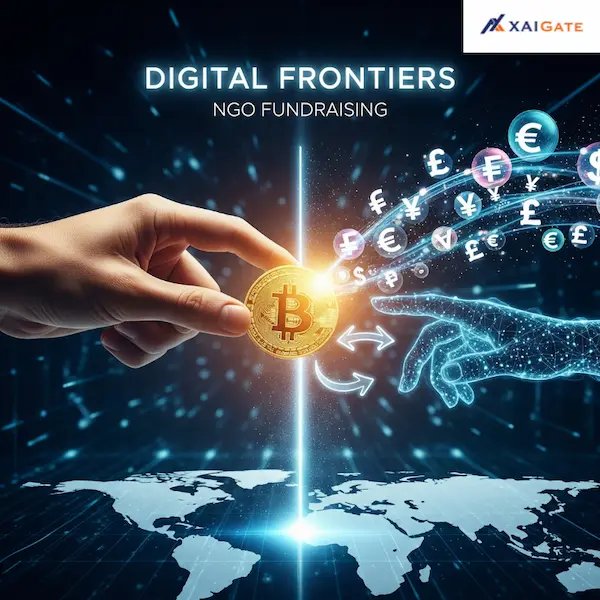
Understanding the Core Question: License vs. Regulation
The main problem does not normally involve a strict “ban” on accepting crypto. Rather, it has to do with whether your NGO’s operations place you in the category of “Virtual Asset Service Provider” (VASP) or some other similar type that requires licensing. If all you’re doing is accepting a donation and then converting it to your local fiat currency, then chances are you are not a VASP. The regulations mainly focus on commercial operations and services that mainly relate to the management of other people’s crypto assets.
What Constitutes a Crypto “License”?
A crypto license is an official permission from a government or financial overseer that lets a company do certain things with cryptocurrencies. This can mean running a crypto exchange, offering wallet services, or working as a broker. The ai͏m of these licenses is to stop illegal actions like money laundering and to keep consumers safe. For an NGO, the question is if their act of getting a donation fits into one of these controlled groups. For most it does not
United States: A Cautious but Open Approach
The United States offers a clear, if somewhat complex, framework for accepting crypto donations. The key is how the government classifies the asset itself.
The IRS and Cryptocurrency as “Property”
The IRS classifies cryptocurrency as property and not as currency. It thus makes a very important distinction for NGOs. When a donor gives crypto, it is to be treated like a non-cash charitable contribution—much the same way stock or real estate is often donated. This means that the value of the donation shall be determined based on the fair market value of the cryptocurrency on the day it was received.
- Tax Deductions: The donor can claim a tax deduction at the full fair market value and does not have to pay capital gains taxes, provided by IRS rules related to non-cash charitable contributions. This makes it very attractive for donors.
- No Licensing: Because it is property being received by the NGO, there is no requirement for a crypto license. All normal tax and non-profit reporting requirements do apply.

Navigating the U.S. Regulatory Landscape
Even though the IRS gives a clear tax framework, other agencies have their say as well. An example is the Financial Crimes Enforcement Network, or FinCEN. Their rules fall under AML and CFT — by the way, as an NGO you do not fall under their licensing requirements unless you are operating as a MSB. Most likely you aren’t just by accepting donations! It’s always good to have strong internal policies when vetting large crypto donations so that none come from illicit sources.
European Union: Navigating the MiCA Framework
The new European Union Markets in Crypto-Assets (MiCA) Regulation forms part of what is now the most comprehensive crypto frameworks anywhere in the world. This framework seeks to harmonize rules on crypto across all 27 member states thereby making it easier for NGOs to understand.
How MiCA Defines Crypto-Asset Service Providers (CASPs)
The main thrust of MiCA is the regulation of Crypto-Asset Service Providers (CASPs). A CASP is an entity that provides services such as:
- Operating a trading platform for crypto-assets.
- Exchange of crypto-assets for fiat currency or of other crypto-assets. Custody and administration related to crypto-assets on behalf of third parties.
- An NGO that just gets a donation and converts it into fiat currency for its own operational purposes would, in most cases, not be considered a CASP. There is no “service” being provided to a third party.
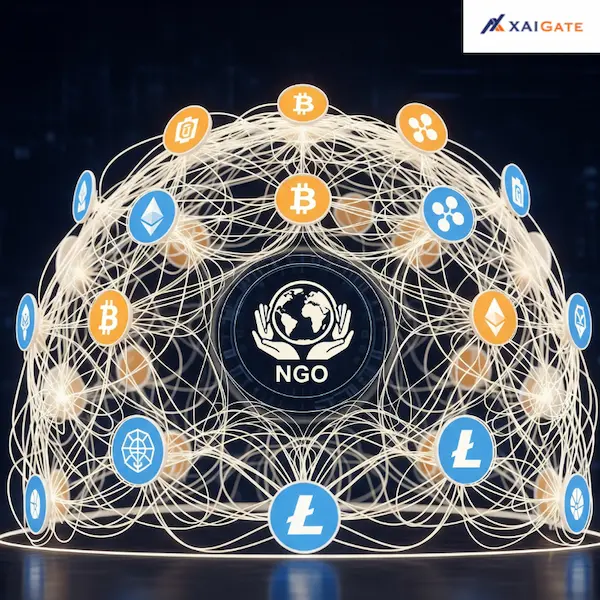
The Path for NGOs in the EU
Under MiCA, an NGO can accept crypto donations without needing a license. They must stay aware of any national-level rules that might still apply. To lower risk and show their aim to follow the rules, many European NGOs use a licensed CASP or work with a special crypto donation platform. These platforms take care of receiving, changing, and reporting, keeping the NGO safe from all the details of the regulatory maze.
Key Countries with Progressive Regulations
Beyond the major economic blocs, several countries have established clear, pro-crypto regulations that make it easy for NGOs to fundraise with digital assets.

Switzerland: The “Crypto Valley”
Switzerland Crypto Facilitation is worldwide known for its progressive approach to the world of cryptocurrencies. Zug city gained the name “Crypto Valley.” In the perception of many, what Switzerland proved more than anything is the fact that a clear and favorable environment, such as provided by the Swiss Financial Market Supervisory Authority, encourages innovation in crypto. Crypto is recognized as an asset and means of payment in Switzerland, and the government has created some legal frames supposed to be used without unnecessary red tape to use it. NGOs can accept crypto donations in Switzerland with full confidence. Many of them are leaders here.
El Salvador: Bitcoin as Legal Tender
El Salvador became the first country in the world to use Bitcoin as legal tender, i.e., by force to accept all goods and services payments with US dollars alongside Bitcoins. For any NGO working in El Salvador, this provides ultimate legal clarity. There is no doubt about whether you need a license to operate with Bitcoin because it is legally mandated for many businesses and just as standard as part of the financial systems.
Countries with Restrictive or Banned Crypto Policies
The most appropriate approach to answering the question, “Can my NGO accept crypto without a license?” would begin with an understanding of the fact that regulators worldwide do not share a unified approach. While some countries are progressively articulating clear pathways toward embracing digital assets in their economies, a good number of countries have adopted unyielding postures through outright bans or highly restrictive policies. For NGOs, it would be extreme folly to operate in such environments and not fully appreciate the legal risks because the attendant consequences could be very dire.
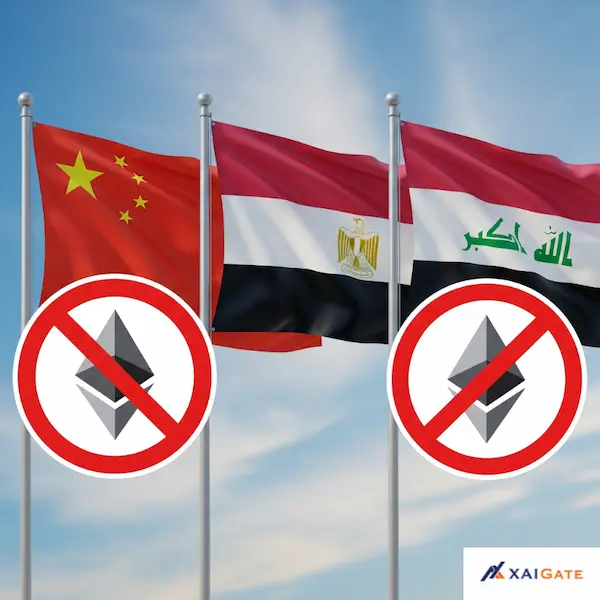
Here’s a closer look at countries where crypto policies are either strict or outright banned:
China: A Comprehensive and Unwavering Ban
China is perhaps the strictest in its approach to cryptocurrency across the globe. The Chinese government has taken steps one after another to crack down on all aspects of the crypto ecosystem. It banned ICOs in 2017 and mandated closures of any crypto exchange operating within its borders, followed by a 2021 crackdown that purportedly made it illegal for anyone inside the country to participate in the market by banning all transactions and mining activities related to cryptocurrencies. The government described this action as an effort towards maintaining financial stability, controlling speculation, preventing capital flight, and inhibiting avenues for illegitimate activities facilitated by cryptocurrency.
What this means for an NGO is that the prohibition is total. An NGO would be in direct violation of the law if it accepted, held, or transacted in any form of cryptocurrency within mainland China. The simple act of receiving a donation for a specific charitable cause would still be considered a banned transaction. The risk is not only financial but could also lead to legal action against the organization’s leadership with fines and even imprisonment.
Egypt: A Restrictive and Cautious Stance
The nature of the potential threat for both individual citizens and Egypt’s entire financial system is not in doubt at all — that much can also be weaved together from Egyptian state media. In Egypt, the Central Bank of Egypt (CBE) has made very strong warnings towards cryptocurrencies. Publicizing in whatever wording exchange or advancement of monetary forms are precluded until getting endorsement from CBE as it is set forth under article 206 of the Central Bank and Banking System Law No. 88 referenced in these lines.
- Why the ban: The Central Bank considers digital currencies too volatile for market trading while also being used to launder money and finance terrorism, as well as lacking legal protection. An official fatwa was also issued by the Grand Mufti of Egypt in 2018, categorising cryptocurrencies as haram (forbidden under Islamic law), thereby shining further light on local unwillingness and apprehension towards introducing them into daily society.
- What this means for an NGO: The law indeed provides a loophole for a special license from the CBE, but it is very improbable and complicated. Hence, it is safe to say that an NGO that is operating in Egypt must treat crypto donations as if they were illegal. Such a transaction would constitute a violation of the law punishable by harsh sanctions, including the payment of fines and possibly imprisonment.
Iraq: A Clear Prohibition
Iraq has additionally made a clear move to prohibit the full range of cryptocurrency operations. The Central Bank of Iraq (CBI) announced a total ban on the use, trading, and storage of digital assets in 2022. The announcement from the CBI was very clear. They said that if anyone is found to be involved in crypto-related activities, they will be arrested and prosecuted in accordance with the anti-money laundering law of the country. The CBI’s stance is grounded on the absence of the regulatory framework for the crypto market, its highly volatile characteristics, and the potential for criminal use.
- What this means for an NGO: The legal stance is clear and leaves no room for interpretation. An NGO in Iraq cannot legally accept crypto without a license—and in this case, a license is simply not an option. The prohibition applies to all individuals and organizations. Any attempt to accept, hold, or use cryptocurrency, even for a charitable cause, would be considered a crime.
Navigating “Gray Area” Jurisdictions
Besides the countries that have completely prohibited cryptocurrencies, there are many other places where the jurisdictions are still unclear in terms of regulations. Those are the locations where the governments have no definite policies, they may be either hostile or just unsure about their stance, and there is no comprehensive legal framework.
- India’s Ambiguous Position: India is a perfect example of the gray zone. The country’s central bank (RBI) prohibited crypto earlier, but the Supreme Court ruled that the ban was illegal. Nevertheless, the draft of a new law is not yet approved, and the situation of the regulation remains ambiguous.
- The Situation of an NGO in Such a Place: An NGO in this situation is not at risk of a ban but rather of an ambiguous situation itself. An NGO may be affected by changes in the policy that come suddenly, by unbearable taxation, or by a situation in the banking sector that is unfriendly and does not want to cooperate with crypto-related funds if no law clearly sets out what is allowed. That is why it is the best thing to go slowly and consult with a lawyer in such cases.
The first and most important step for any non-governmental organization thinking about utilizing cryptocurrency is to thoroughly research the legal situation of cryptocurrency in the country they operate in. In countries where the bans are in place or there are policies that are very restrictive, the safest and only option that does not violate the law and thus do not cause danger to the organization, the staff, and the mission is to refrain from all crypto-related activities.
Exploring Unknown Territory
Such places are not black-and-white and they do not have any regulation of cryptocurrencies but they are generally skeptical and they are not sure about their stance on regulation. For an example, the previous ban was overturned by the Supreme Court in India, however, the government has still not passed any comprehensive cryptocurrency legislation and this has created a situation that is called a “gray area” where it is the best option for NGOs to be cautious and if the organizations decide to go on, they should choose the ones that operate on the international level and, therefore, manage the donations offshore.
Best Practices for NGOs: A Global Blueprint
Best practices are key. In whatever country you plan to accept donations, best practices are key.
Using a Third-Party Crypto Donations Platform
The easiest, and safest way to accept crypto without a license is through a dedicated third-party platform built specifically for nonprofits that does all of the heavy lifting.
- Compliance management. They are usually registered and licensed VASPs, hence performing all required AML/CFT checks.
- Auto-conversion, being able to convert crypto donations into any preferred fiat currency immediately, thus shielding the organization from market volatility. Security having safe, institutional-grade custody for the assets until converted or transferred to your bank account.
- Donor experience having a friendly interface for the donors and automatically generating the required tax receipts.
Due Diligence and Donor Vetting
While the decentralized nature of crypto can offer anonymity, NGOs should still perform due diligence, especially for large donations. Having a clear policy for accepting donations over a certain threshold and using blockchain analytics tools can help ensure that funds are not from illegal sources. This is a matter of both legal compliance and protecting your organization’s reputation.
Establishing a Clear Internal Policy
Before accepting your first crypto donation, your NGO should have a formal, board-approved
Have a policy approved by the board before you accept your first crypto donation. Include in this policy what particular cryptocurrencies to accept, how donations will be processed (for example through a third-party platform), and whether you will hold or immediately convert the crypto to fiat. It should also clearly outline record-keeping and financial reporting processes.
The Future of Crypto Philanthropy
With the mainstream adoption of cryptocurrency, the use of it for philanthropic purposes will also be mainstream. Rules and regulations may keep changing from time to time but the trend scenario is towards more clarity and integration between systems. For NGOs, this ensures opening up a new pool of donors. With proper precautionary measures, it can be done legally.
A Comparison of Crypto Regulation Tiers for NGOs
| Tier | Countries/Regions | Key Regulatory Stance | NGO Action |
| Leader | United States, Switzerland, Canada, Japan, El Salvador | Clear legal frameworks, often treating crypto as property or legal tender. Regulations focus on service providers, not donation recipients. | NGOs can confidently accept donations directly or via platforms. |
| Regulated/Emerging | European Union (MiCA), Singapore, UK, UAE | Developing comprehensive frameworks. MiCA focuses on CASPs, leaving room for NGOs to operate. | NGOs should partner with licensed third-party platforms to ensure compliance. |
| Gray Area | India, Brazil, Mexico, Russia | Undecided or hostile. Lack of clear legislation creates uncertainty for both donors and recipients. | Proceed with extreme caution; using platforms that operate from a more regulated jurisdiction is highly recommended. |
| Banned/Hostile | China, Egypt, Iraq, Bolivia | Outright bans on crypto use, trading, or ownership. | Avoid all crypto-related activities. It is illegal and puts the organization at risk. |
Key Considerations for Accepting Crypto Donations
| Consideration | Description | Best Practice |
| Legal/Regulatory | Does your country require a license for crypto transactions? | Check local laws. Most NGOs don’t need a license for passive donations. |
| Financial Reporting | How will you value and report the donation for accounting? | Use the market value on the day of receipt. Keep detailed records of all transactions. |
| Tax Implications | How do tax laws in your country affect both the NGO and the donor? | Consult a tax professional. In some countries like the US, donors receive significant tax benefits. |
| Market Volatility | How will your organization handle potential price swings of the crypto? | Use an auto-sell feature on a donation platform to immediately convert crypto to fiat. |
| Security | How will you securely store the donated crypto? | Use a third-party platform with institutional-grade security. Self-custody is generally not recommended. |
| Donor Vetting | How will you ensure donations are from legitimate sources? | Implement a policy for large donations, and use blockchain analytics if needed. |
A Path Forward for Your NGO
The question of whether or not an NGO can receive crypto without a license is not just a legal query; it is also strategic. While details may vary from country to country, generally speaking, the answer is yes so long as your organization acts as the recipient and not the financial service provider. If you know your local regulations, use third-party platforms whose expertise you can leverage, and have strong internal policies in place, your NGO will be able to raise funds securely and effectively in this new digital age. The future of philanthropy is decentralized. By embracing this new frontier responsibly, you can open a world of new opportunities for your mission, visit our brand partner at trusted crypto payment gateway
FAQs – Accept Crypto Without a License?
1. Can I legally accept cryptocurrency payments without a license?
In most jurisdictions, accepting cryptocurrency payments is allowed without a license—as long as you’re not offering custody or converting crypto to fiat. Still, double-check local regulations before proceeding.
2. What exactly does “without a license” mean in crypto payments?
It means you handle crypto directly (non-custodial), never manage fiat conversions or hold user funds—so you’re not acting as an exchange or a regulated payment processor.
3. How does a non-custodial gateway simplify compliance?
Non-custodial gateways let businesses accept crypto without gathering customer IDs or navigating KYC rules. This reduces friction and avoids many regulatory hurdles.
4. Are there any countries where KYC is mandatory even for accepting crypto?
Yes—some regulated jurisdictions like the US or EU require KYC if you provide custodial services. But if you’re only accepting crypto as a merchant, the requirement may not apply.
5. What are the main risks of accepting crypto without a license?
The key risk is legal uncertainty—it depends on your country’s stance. Volatility and potential fraud also matter, so choose secure, privacy-focused gateways.
6. How do non-custodial crypto payment gateways protect me as a business owner?
They keep funds in your own wallet, not theirs, while providing transaction tracking and fraud prevention—so you maintain control and limit your liability.
7. What features should I look for in a no-license crypto gateway?
Key features include: non-custodial operation, webhook tracking, low fees, and multi-platform integration to simplify setup and protect data.
8. Are refunds possible when accepting crypto payments?
Yes—but not automated like credit cards. You must manually send crypto back to the payer’s wallet and clearly state this process in your refund policy.
9. How quickly can I start accepting crypto with a non-licensed gateway?
Very fast—setup can take as little as 30 minutes using plugins (e.g. WooCommerce) or APIs, with no KYC or lengthy onboarding required.
10. Why do some businesses prefer accepting crypto without a license?
Because it offers privacy, speed, cost savings, and global reach—especially for those targeting privacy-conscious customers or operating internationally.

